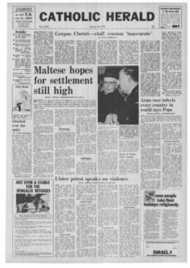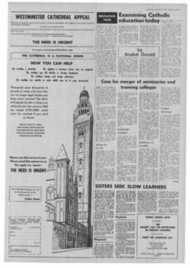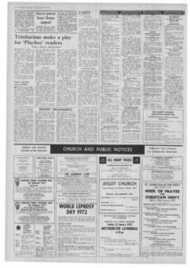Page 8, 14th January 1972
Page 8

Report an error
Noticed an error on this page?If you've noticed an error in this article please click here to report it.
Tags
Share
Related articles
Walking With God
Corpus Christi Staff Version 'inaccurate'
Soaring Costs Close Corpus Christi College
Shorne Goes To Their Newest Carmelites
Somerset Evacuees See First Corpus Christi Procession...
Corpus Christi
(from page 1)
Corpus Christi. Some had become attached to the easygoing intimate way of life at Corpus Christi and came to resent the normal discipline of their own communities. This was obviously a problem, and to help to solve it I urged the Council of Major Religious Superiors to call for greater discretion in the choice of candidates for Corpus Christi. "I suggested that the main source of trouble was not the college itself but the lack of maturity in those who were being sent there. I had no control over religious superiors outside this country, and a number of unsuitable candidates continued to arrive. As a result Corpus Christi remains out of favour with some of the main congregations. "Happily superiors of other congregations agreed to send only mature students. I must pay a special tribute to these Sisters. Through no fault of theirs or of the college, they often had to put up with hostility from members of their own community. To be at Corpus Christi was in some quarters to become an object of suspicion. This was deplorable and was due not to Corpus Christ but to the indiscretion of a minority of its students.
DEVELOPMENT
"A great deal of criticism has been made of the teachings of religion at Corpus Christi. I trust and have always trusted Fr. Richards as a theologian. I have never thought that he would permit unsound theology to be taught here. I know how easily new ideas are wrongly assumed to be false ideas. On more than one occasion I have defended Corpus Christi and contemporary catechists. They naturally follow current fashions in theology, and these change rather more than once in each generation.
"My chief reserve, of which I have often spoken to Fr. Richards, is the advisability of giving the same course of speculative theology to priests with years of philosophy and theology behind them, and to nuns and laity virtually untrained in either.
"In his view a catechetical college needs a mixed student body. Looking at Regina Mundi in Rome or St. C..atherine's Centre in London. both colleges which cater only for nuns, I am not at all sure that this view is correct. But at least it is a valid point of view. I think that the new Corpus Christi must provide alternative courses according to the theological development of each student.
"I repeat that I have never made any objection to what is taught at Corpus Christi, nor have I ever interfered with the freedom of the teachers. At the same time I must say that if I had reason to believe that false doctrine were being given it would have been my duty to intervene. A Catholic theological institute is not free to propagate error. I have never thought that the teaching at Corpus Christi was unorthodox, but I have a growing feeling that it is inadequate.
"The whole course cornprises only three terms of eight or nine weeks. It is pitifully short. In my view such a short course defeats its object by including too many subjects in the curriculum. I doubt if there is time for lectures not concerned with theology or teaching techniques.
"Although I, personally, was never worried about the orthodoxy of the teaching at Corpus Christi, it is well known that some parents, priests and teachers up and down the country were far from happy. I shall refer again later to the question of orthodoxy, but first let me return to my own dealings with the college.
"From the early days I spoke to the Principal about softness. This is not, as Mr. De Rosa suggested last week in the Times, merely a question of priests and nuns calling each other by their Christian names or of discarding clerical dress and the religious habit. These arc only outward signs. Their significance should not be exaggerated, but they still have their importance. English reserve cannot be lightly laid aside without risk.
DISHEARTENED
"Customs which are current in America and on the Continent are not necessarily good for priests and religious with our background. It is not our way to go to extremes. A few years ago on the Continent you would not have seen a cleric out of a cassock or a nun in lay clothes. We English were
considered very worldly be cause we wore black suits and clerical collars in place of a cassock. Today in many countries abroad the cassock has been abandoned. A priest more often than not is dressed as a layman.
"Much more important than dress are attitudes. A few graduates have developed wrong attitudes towards the Church and, of course, Corpus Christi is blamed. Superiors who have had to deal with difficult subjects who subsequently relinquished the priesthood or the religious life. readily blame the college. A few priests and religious who now appear to hold authority in contempt are said to have been completely transformed by the course at Corpus Christi.
"I can give you an actual example of wrong attitudes without breach of confidence, because the facts are widely known. While Mr. De Rosa was vice-principal of Corpus Christi he organised two round robins. The first, addressed to the bishops. demanded that a priest rejecting his prieshood he allowed to marry after one month. The second was the letter to the Times denouncing the encyclical Hamanae Vitae.
"These documents were addressed from Corpus Christi, and priests from the college were associated with Mr. De Rosa's campaign. You will understand why the bishops lost confidence in Corpus Christi and why 1, who had always defended the college, began to feel disheartened and, in some measure, betrayed.
"Let me now say a word about the bishops. I have received a number of letters from former students of Corpus Christi during the past few days. They are naturally saddened by what they have heard. Some having read the words of the staff, and especially those of Father Wetz, have written passionately and bitterly. They are severely critical not only of me but of all the bishops.
"When 1 informed the bishops that I was about to open a catechetical college, they were enthusiastic. I asked them to support me by sending priests as students. This they willingly did. and in the beginning we had a number of diocesan priests at Corpus Christi.
"Once the college was well established I suggested that it become a national college. I invited the bishops to nominate governors, but I did not ask them to assume any financial obligations. From time to time I have had to look for funds to keep the college open. The governing body was not a success. The meetings of the board did little more than hear reports from the Principal.
"Some of the more experienced members of the board grew impatient of being governors without authority to govern. In particular they complained at having no voice in the curriculum or the appointment of lecturers. They felt unable to defend the college against the criticisms of priests and teachers.
"The bishops meanwhile had become less disposed to send priests to Corpus Christi. Despite my efforts to reassure them, they felt little confidence in the college. By the autumn term of 1970 not a single diocese in the country except Westminster had a priest at Corpus Christi. 1 had to acknowledge that I had failed to make Corpus Christi acceptable as a national institution and it reverted to the diocese.
PSYCHOLOGY
"Although I never felt any need to criticise the theology of Corpus Christi I intervened occasionally in other matters. When I learned of it, I put an end to the custom of beginning the scolastic year with a course of group dynamics. This form of experimental psychology can be dangerous. and I felt it might contribute to the breakdown of reserve which is a safeguard to those living under vows.
"There is great justice in the claim that Corpus Christi is a loving community. This is excellent, but priests and nuns are members of this community for only a few months. If the atmosphere is completely relaxed, it can spoil them for life in their own religious families to which they will return.
"1 come now to the facts of the present situation. It began last summer when Mr. De Rosa told me that he intended to give up the priesthood. Peter De Rosa and I have always been on excellent terms. However much I disapproved of his actions I never doubted his sincerity or lost his friendship. I do not propose to discuss my relationship with him as his bishop but without any breach of confidence 1 can say that over the years, far from pressing him to resign, I did everything in my power to save his vocation.
"At his request, no immediate announcement of his intention to leave the priesthood was made, He wished to postpone this until his return from a catechetical course he was to give in the United States of America. I agreed to the postponement on condition that his American hosts were told in advance that he would renounce his priesthood at the end of the course. The American catechists did not regard his renunciation of the priesthood as a sufficient reason for cancelling his lectures.
RESIGNATION
'Just before his return to this country I learned that Mr. De Rosa proposed to hold a press conference on leaving the priesthood. Remembering the aftermath of the widely publicised departure of Mr. Davis, I thought it wise to cushion the shock by announcing in advance his resignation from the staff of Corpus Christi. I issued a statement headed 'The new Corpus Christi', in which I undertook to take steps to restore confidence in the college.
"I had in mind to appoint theologians who would command the respect of the Catholic body. I asked the Provincial of the Jesuits and the Principal of Heythrop College for their help. which they gladly promised to give. It was my intention that these theologians should replace not the existing staff but the visiting lecturers.
"It has been assumed that I have condemned these lecturers. In fact I have neither condemned them nor published their names. With another type of audience these men might be admirable. They happened not to be the people I needed to heal the wound inflicted on Corpus Christi by the sudden departure of the two priests.
"You know from press reports that Fr. Richards and most of the members of the staff resigned immediately. I received a formal letter of resignation signed by each of them. These resignations were not of my choosing, nor was resignation a 'polite word for dismissal. In the letter of resignation Fr. Richards wrote: " 'there is between us'such a divergence of understanding on the nature of religious education that it would be inappropriate for us to remain as a staff in charge of your college.'
"They were however willing to defer their departure until the end of the next scholastic year on condition that the invited lectureres were not displaced by the theologians I wished to appoint. Fr. Richards' letter went on: " We realise that to take action on this at this moment would place you in an impossible position. To avoid this, as well as the shock that such an action would cause to the Catholic community of this country. and
also to honour our professional obligations to the sixty-five students whom we have accepted for next year. we are willing to serve you here for the coming year on the understanding that we continue to enjoy for that period the academic freedom we have enjoyed so far. This means that our resignation would become effective from July 1972.'
"I was obviously in a dilemma. We were nearly at the end of August—the resignations were dated the 21st August 1971. 1 had to decide whether less scandal would be caused if the resignations took effect at once or not until July 1972. You must realise that no other alternative was offered to me. They had said quite simply that their understanding of the nature of religious education was incompatable with my own.
"I could not honestly deny that this might be true. It may be thought that I should have allowed the resignations to take effect at once. Against this I thought of the students who had made their arrangements and those from overseas who might already have left home on their way to London. Before making my decision T wrote to the Apostolic Delegate and the other four Archbishops for advice. Some thought that despite the inconvenience it would cause, Corpus Christi ought not to remain in the care of the priests and nuns who had given an ultimatum.
"Others agreed with me that it would be better to allow the staff to remain for a year, despite their repudiation of my idea of religious education. it is scarcely necessary to add that this idea of religious education is shared by all our bishops.
SEQUENCE
"It has been alleged that the staff were told that their resignation had been aCcepted only last month, when twenty-eight bishops had come at my invitation to a conference on catcchetics here at Corpus Christi. The sequence of events was rather different.
"Just before leaving for the Synod in Rome, I wrote to Fr. Richards telling him that the two priests and the two nuns on the staff owed it to their religious superiors to inform them that they had resigned and would be free to take up other work after July 1972. What happened last December was this.
"By the first post on the morning the catechetical conference was due to open I received a letter from Fr. Richards saying that he wanted, in his phrase. "to put me in the picture" about what was going to happen at Corpus Christi in the scholastic year 1972/73. He informed me that he had invited an Irish Jesuit to join the staff and was on the point of inviting two others. One, I think, was a Dutch priest and the other a Brother from the United States.
"It would be an understatement to say that Fr. Richards' letter came as a surprise. Immediately after receiving the resignations last August I had begun looking for staff for next year. Some potential members of staff, including the new Principal, had been invited to attend the catechetical conference with the bishops. When I arrived at Corpus Christi that morning I told Fr. Richards that next year's staff would be appointed by me in consultation with the new Principal.
"The following day during an interval in the conference, met the staff and we had what can only be called a heated discussion. They wanted me to make an immediate announcement to the bishops and other clergy present at the conference.
"This I was unwilling to do. The bishops, of course, knew that the present staff has resigned, but I thought it unwise to make the news more general while the scholastic year still had two thirds to run.
"This is the story so far. On more than one occasion I have told the staff of Corpus Christi that the diocese of Westminster is more important than its present archbishop and Corpus Christi more important than its present staff. It would be sad if the college were to fail at the very moment when the whole Church has begun to see the importance of catechetics.
"I believe that the new Corpus Christi will profit by the mistakes which have been made. The course will be varied according to the capacity of the students. I am confident that the new Principal and staff will bring to their task the same zeal and love of our Lord which characteris-ed the old staff. "The new Principal is Fr. Michael Keegan, parish priest and Dean of Rotherham, Yorkshire. Forty-six years of age, he was educated at St. Bedes grammar school Bradford, Fort Augustus and Ampleforth. He studied philosophy at the English College, then at Stonyhurst. After three years military service he studied theology for five years at the English College in Rome.
"After twelve years in parish work he took a teachers' training course at Strawberry Hill, and spent a year studying catechetics at Lumen Vitae in Brussels. For the next four years he was a lecturer on the staff of Trinity and All Saints training college, Leeds. With such a preparation I believe that he is fitted to take charge of Corpus Christi College.
"I have given you a frank acount of my dealings with the staff of Corpus Christi. I hope I have shown that it was by no wish of mine that their term of service has ended in this way. I am truly grateful to them. As they know. I have always defended Corpus Christi and what it stands for. I shall continue to do so, and in this I believe I shall have the support of the bishops, clergy and Catholic people of this country.
"I end by expressing the hope that Corpus Christi will continue to enjoy the loyal support of its past students. I pray that it will always be distinguished for its love of the Holy Eucharist from which it takes its name."
blog comments powered by Disqus











